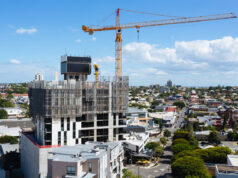A consortium of companies has taken the first step in developing a sustainable soft plastics recycling industry in Australia. Coles, Nestlé, technology developer Licella, recycler iQ Renew, and polymer manufacturer LyondellBasell have announced a joint feasibility study into the technical, economical and environmental benefits of building a soft plastics recycling plant in Victoria.
The advanced recycling facility will use technology developed by Licella known as Cat-HTR (Catalytic Hydrothermal Reactor), a form of hydrothermal liquefaction that transforms biomass, waste plastic and industry residues into synthetic oil or biocrude that can be used in the manufacture of flexible food packaging such as bread bags, cereal liners and biscuit wrappers.
Licella CEO Dr Len Humphreys says that advanced recycling in Australia will give food brands access to the food-grade recycled packaging they need to reduce their use of virgin plastic.
“We believe advanced or chemical recycling has an important place in the future circular economy for plastic, creating greater value and less emissions than waste to energy,” he says.
CEO of iQ Renew, Danial Gallagher, insists that advanced recycling has the potential to significantly increase the amount of plastic recycled in Australia. “Advanced recycling complements existing mechanical recycling, as it can process plastics that are difficult to recover mechanically, such as soft plastics, multi-layer packaging and plastic that has been degraded by repeated mechanical recycling,” he says.
Government announces new National Plastics Plan
The feasibility study’s announcement follows the Federal Government’s new National Plastics Plan 2021, which addresses the crisis in plastic waste management in Australia.
Single-use plastic made up around a third of the 3.4 million tonnes of plastics Australians used in 2018-19. Most plastic – 84 per cent – ended up in landfill, while just 13 per cent was recycled. Soft plastics recycling has posed a unique problem in Australia, which lacks the facilities to recycle the 70 billion pieces of ‘scrunchable’ plastic used each year.
A waste export ban under the newly enacted Recycling and Waste Reduction Act 2020 prohibits the export of unsorted mixed plastics from July 1, 2021 and unprocessed single polymer or resin plastics from July 1, 2022.
The National Plastics Plan includes the standardisation of kerbside recycling around the country and the phasing out – by 2022 – of non-compostable plastics, expanded polystyrene used in loose packaging fill, moulded packaging and food and beverage containers, and PVC packaging labels.
Under the plan, National Packaging Targets require all packaging to be reusable, recyclable or compostable by 2025, and 70 per cent of plastic packaging to be recycled or composted. It also requires new packaging to be made from at least 50 per cent recycled content, which is expected to boost the demand for the type of food-grade plastic produced using Cat-HTR technology.
In July 2020, the Federal Government committed $190 million to the Recycling Modernisation Fund, an initiative designed to increase the nation’s recycling capacity and generate 10,000 jobs and $600 million of investment in the industry.














